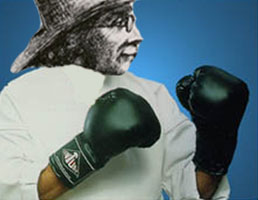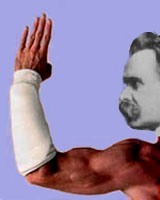

KIERKEGAARD VS. NIETZSCHE


K: "...The Romans always won their battles -- why? Because rigorousness helped them, helped them to fear that which was worse than death and therefore helped to be victorious. So also with Christianity. There was a time when it, with divine authority, exercised dominion over people, when it addressed each individual briefly, tersely, commanding authoritatively with "You shall"; when it shocked every individual with a rigorousness that hiterto was never known: eternal punishment. This rigorousness helped; in fear and trembling before the inescapable hereafter, the Christian was able to disdain all the dangers and sufferings of this life as child's play and a half-hour prank... This was the militant Church; Satan himself accomplished nothing against it, except to give the heroes of the faith the desired opportunity to be surrounded with the incorruptible radiance of martyrdom." - Practice in Christianity No. III, V, p. 229Faith and Reason 1:
N: "In one party, there was a man who was too anxious and cowardly ever to contradict his comrades. They used him for every service; they demanded everything of him, because he was more afraid of the bad opinions of his companions than of death itself. His was a miserable, weak soul. They recognized this and on the basis of those qualities they made him first into a hero and finally into a martyr... he really did suffer death in the most seemly way, and has since been celebrated as a martyr and a man of great character." - Human, All Too Human, On the History of Moral Feelings, 73, p. 59
K: "The God-man is the paradox, absolutely the paradox. Therefore, it is altogether certain that the understanding must come to a standstill on it." - Practice in Christianity, No. II, A Brief Summary of the Exposition, p. 82Faith and Reason 2:
N: "...One can simply not engage in Christianity, given the present state of knowledge, without hopelessly soiling his intellectual conscience and abandoning it to himself and to others." - Human, All Too Human, Religious Life, 109, p. 78
K: "Can any more foolish contradiction be imagined than this, to want to demonstrate that an individual human being is God? That an individual human being is God, that is, claims to be God, is indeed the offense in an eminent sense. But what is the offense, that which offends? That which conflicts with all (human) reason... Can one, then, make that which conflicts with all reason into the rational-actual? Certainly not, unless one wants to contradict oneself. One can "demonstrate" only that which contradicts with reason. The demonstrations for the divinity of Christ that Scripture sets forth -- his miracles, his resurrection from the dead, his ascension -- are indeed only for faith, that is, they are not "demonstrations." Neither do they want to demonstrate that all this is in complete harmony with reason; on the contrary, they want to demonstrate that it conflicts with reason and consequently is the object of faith." - Practice in Christianity, No. 1, The Halt, p. 26Perspectivism:
N: "When we hear the old bells ringing out on a Sunday morning, we ask ourselves: can it be possible? This for a Jew, crucified two thousand years ago, who said he was the son of God. The proof for such a claim is wanting." - Human, All Too Human, Religious Life, 113, p. 84
K: "Only the consciousness of sin is absolute respect. And just because Christianity insists on having absolute respect, from any other perspective Christianity must and will appear as madness or horror in order that the qualitative infinite emphasis can fall upon the fact that the consciousness of sin is the only admittance, is the view that, by being absolute respect, is able to see the gentleness and love and compassion of Christianity." - Practice in Christianity, No. 1, The Moral, p. 68Pharisaism:
N: "Once man has grasped 'how sin came into the world' (which is to say, through errors of reason, due to which men take each other -- and the individual takes himself -- for much blacker and more wicked than is actually the case), then his whole mood is greatly improved, and men and world seem at times to be in such a halo of harmlessness as to make him utterly contented." - Human, All Too Human, Religious Life, 124, p. 87
K: "By making devoutness and piety inwardness, Christ prodded this whole structure of qualifications and relativities, this direct recognizability of piety by honor and esteem, power and influence, this objectivity, as the scribes and Pharisees would have called it. Altogether convinced of being right and probably assured in advance that Christ would have to lose, they pose to him the question of why his disciples transgressed the ordinances of the ancients... The scribes and Pharisees had become so holy... under the guise of worshiping and adoring God, they worship and adore their own invention, either in self-complacent joy, since they themselves are the inventors, or in fear of people." - Practice in Christianity, No. II, The Exposition, p. 92(Un)Truth:
N: "Pharisaism is not a degeneration in a good man: a good deal of it is rather the condition of all being good." - Beyond Good and Evil, Epigrams and Interludes, 135, p. 278
K: "Christianly understood, truth is obviously not to know the truth but to be the truth. Despite all modern philosophy, there is an infinite difference here, best seen in Christ's relation to Pilate, for Christ could not, could only untruthfully, reply to the question 'What is truth?' precisely because he was not the one who knew what truth is but was the truth... Therefore it says, 'This is eternal life to know the only true God and the one whom he sent,' the truth. That is, only then do I in truth know the truth, when it becomes a life in me." - Practice in Christianity, No. III, V, pp. 205-206KNOCKOUT! KIERKEGAARD WINS!!
N: "It is the profound, suspicious fear of an incurable pessimism that forces whole millenia to bury their teeth in and cling to a religious interpretation of existence: the fear of that instinct which senses that one might get a hold of the truth too soon... Piety, the 'life in God,' seen in this way, would appear as the subtlest and final offspring of the fear of truth... as the will to the inversion of truth, to untruth at any price." - Beyond Good and Evil, What is Religious, 59, p. 261
 Round 2
Round 2